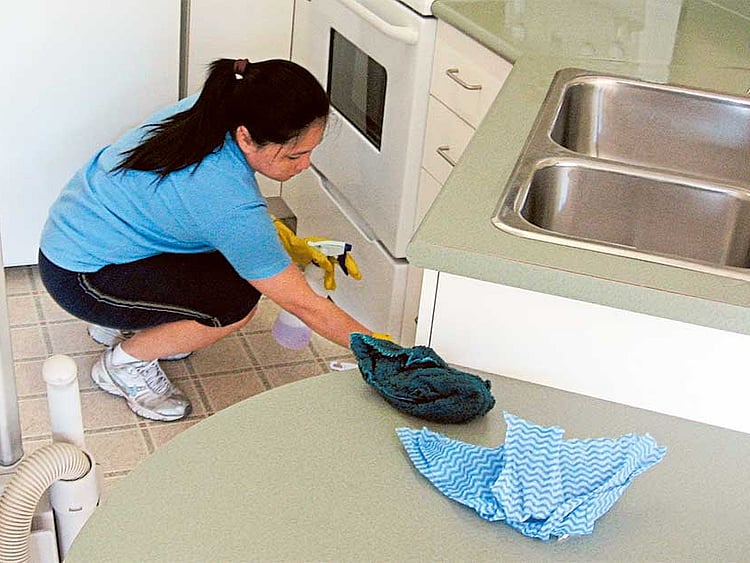Hiring a Filipina helper? It now costs $500/month, but it stays at $400/month for GCC
“Floor” $400 wage for Filipino domestic helpers in place for the last 2 decades

Manila: The Philippine government announced the $100-a-month salary increase for its domestic workers – a 25% hike in base pay – as part of a new policy recently announced by the Department of Migrant Workers (DMW).
Manila, however, has backed off from enforcing it in Gulf Cooperation Council (GCC) countries following strong concerns and pushback from Gulf states.
What did Manila announce?
On August 22, 2025, in Advisory No. 25-2025, the Department of Migrant Workers (DMW) announced that the minimum monthly wage for domestic workers from the Philippines will increase from $400 to $500, a 25% hike.
The policy aimed to integrate the $500 (₱28,482) minimum into all new or renewed employment contracts globally.
Who decided on the pay hike?
The announcement was made by Hans Leo Cacdac, the Secretary of the Philippines' Department of Migrant Workers (DMW), during a media briefing on August 22, 2025, in Makati City, Philippines.
The changes (reforms), including the wage hike, were formalised through DMW Labor Advisory No. 25 (2025), signed by Cacdac on the same day. Cacdac said the initiative aligned with directives from President Ferdinand R. Marcos Jr. to enhance the “dignity and welfare” of overseas Filipino workers (OFWs).
What was the reason for the increase?
The primary reason: recognise domestic work as a “profession of equal value deserving fair compensation”.
It also addresses the fact that the previous $400 minimum had been unchanged since 2006 (nearly 20 years) despite rising living costs, especially in the Philippines.
It was part of an eight-point reform agenda to improve the welfare, rights, and protections for vulnerable OFWs.
The hike aimed to provide better financial support for workers’ families amid inflation and to encourage upskilling (e.g., transitioning to higher-paid roles like caregivers).
A "60-day transition period" was initially set for agencies and employers to update contracts.
What countries were initially covered by Advisory No. 25-2025?
The salary increase was part of a broader set of reforms intended to apply to all destinations where Filipino domestic workers (also known as “household service workers” or HSWs) are deployed overseas.
This includes major employers such as GCC countries (Saudi Arabia, United Arab Emirates, Qatar, Kuwait, Bahrain, and Oman), as well as other regions like Asia (e.g., Hong Kong, Singapore, Taiwan, Japan, Malaysia, Israel), Europe (e.g., Italy), and North America (e.g., Canada).
Why did Manila back off?
In a nutshell, the decision was made to "maintain a sustainable recruitment framework".
The "reversal" was confirmed after diplomatic discussions, highlighting the lack of prior consultation with host countries as a key issue.
Qatari media has reported that the Philippines will not enforce a planned wage hike for Filipino domestic workers in GCC countries as salaries will be set by "supply and demand" .
Cacdac also confirmed the same following talks in Doha last week with Qatar’s Minister of Labour, Dr. Ali bin Samikh Al Marri, saying the wage-setting mechanism would be "reviewed" to strike a balance between the interests of both sides.
There are ongoing talks to balance worker protections and employer interests.
How many Filipino domestic workers are deployed overseas?
The Manila government does not know exactly how many household service workers (HSWs) are deployed at any given time.
It's not immediately clear if DMW is utilising access to big data. Manila has also rolled out e-passports, using contactless microchip technology. Historically, HSWs have been a significant component of the Philippine “labour export” industry.
The HSW data is not precisely separated from overall Overseas Filipino Worker (OFW) statistics.
In the first half of 2023, the latest for which data is available, a total of 2.16 million OFWs were active, with 55.6% being women.
Which countries are now exempted?
The GCC countries (Saudi Arabia, United Arab Emirates, Qatar, Kuwait, Bahrain, and Oman) are now exempted from the enforced $500 minimum wage.
In these nations, wages will revert to being set by market supply-and-demand rather than the Philippine-mandated floor.
Other destinations remain subject to the increase, though actual implementation may vary based on local laws and negotiations.
What is the way forward?
The DMW has adjusted its approach, showing flexibility, in order not to disrupt prevailing recruitment processes.
The DMW announcement in August 2025 aimed to enforce the hike as part of an eight-point reform package to enhance worker protections.
However, after diplomatic consultations in Doha on September 11, 2025, the DMW decided not to impose the $500 floor on GCC countries.
What it means:
The unilateral hike announced by Manila was criticised for lacking prior consultation.
The reversal was announced by DMW Secretary Hans Leo Cacdac after meetings with Qatar's Labour Minister Dr. Ali bin Samikh Al Marri and other GCC officials.
The rationale: respect existing bilateral agreements and ensure sustainable deployment,
DMW emphasises that this does not abandon worker welfare; instead, it shifts focus to “collaborative mechanisms” to prevent exploitation while balancing employer interests.
The $500 minimum wage remains in effect for HSW deployments to other destinations, such as Hong Kong, Singapore, Taiwan, Japan, Malaysia, Italy, and Canada, where it will be integrated into new or renewed employment contracts processed by the DMW.
A 60-day transition period (from August 22, 2025) allows recruitment agencies and employers to adjust contracts.
Enforcement will occur through DMW's oversight, including sanctions for non-compliance and integration via the department's complaint system (AKSYON Fund).
The DMW will continue engaging host governments in these regions to ensure smooth implementation, with the wage serving as a "floor" that can be higher based on skills, experience, or local laws.
Sign up for the Daily Briefing
Get the latest news and updates straight to your inbox
Network Links
GN StoreDownload our app
© Al Nisr Publishing LLC 2026. All rights reserved.